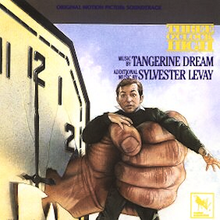|
Three O'Clock High
Three O'Clock High is a 1987 American teen comedy film directed by Phil Joanou. The script, about a meek high schooler who is forced into a fight with an unstable new transfer student, is based on the high school experiences of screenwriters Richard Christian Matheson and Thomas Szollosi. It was shot in Ogden, Utah. PlotMeek high school student Jerry Mitchell and sister Brei are home alone while their parents vacation. The Weaver High School students this morning gossip about new student Buddy Revell, an allegedly violent psychopathic delinquent transferred from a continuation high school. Jerry's day begins at the school newspaper, where his best friend, Vincent Costello, is editor. Their journalism teacher suggests an article to welcome "new kid" Buddy and assigns Jerry an interview. Jerry sees Buddy in the restroom and clumsily attempts to introduce himself but realizes he is annoying Buddy. He tells Buddy to disregard the interview request, and taps Buddy's arm affably. Buddy, who has a touch phobia, throws Jerry against a wall and declares the pair will fight outside school at 3:00 P.M. Buddy warns that running away or reporting the incident would only worsen matters. As time runs out, Jerry tries different strategies to avoid fighting. Attempts to reason with Buddy don't work. Vincent plants a switchblade in Buddy's locker to get him kicked out of school; Brei advises Jerry to skip school, but in his mom's car Jerry finds the switchblade stuck in the steering wheel and ignition wires cut. Jerry tries to run, but overzealous security guard Duke catches him. Duke finds the switchblade and takes Jerry to Dean of Discipline Mr. Dolinski, who warns Jerry is under suspicion. Jerry's further attempts to avoid the fight are not successful, until he steals cash from the school newspaper. Buddy ultimately accepts the cash to call off the fight, but proclaims Jerry a coward since he didn't even try to fight. Seized with self-loathing and anger, Jerry confronts Buddy and demands the money back. Buddy refuses, and Jerry agrees to the fight. The clock finally reaches the appointed hour, and the fight begins before hundreds of eager students. Principal O’Rourke tries to break it up, but when he touches Buddy's shoulder, Buddy punches him to the ground. Duke and Jerry's friend Franny also intervene, but Buddy knocks out Duke and pushes Franny aside. Jerry, though out-matched, stands his ground while being knocked down. Buddy takes out his brass knuckles, but Vincent distracts him and he drops the weapon, which Brei picks up and slips to Jerry. Jerry desperately uses the brass knuckles to punch Buddy, knocking him out and winning the fight. During the subsequent excitement and police arrival, Buddy vanishes while Jerry is let go for the day. The next morning, students show Jerry their admiration and support. They buy individual sheets of paper for $1 from the school store to make up the missing cash. Buddy appears, silencing the crowd, and returns the money to Jerry. Weaver is filled with new gossip, as Jerry, now allegedly dating his crush Karen, replaces Buddy as hot topic. Rumors deviate far from the truth. Cast
Soundtrack
The film's soundtrack is the thirty-first major release and ninth soundtrack album by Tangerine Dream. Additional music was provided by Sylvester Levay.[2] The song, "Something to Remember Me By", was written and performed by Jim Walker. Track listing
PersonnelReleaseBox officeThe film opened in 849 theaters nationwide on October 9, 1987, and earned $1,506,975 on its opening weekend, 40.9% of its total gross. The total lifetime gross is approximately $3,685,862, against the original budget of $5,000,000.[citation needed] Critical responseThe film earned mixed reviews, and has a "fresh" rating of 60% on review aggregator website Rotten Tomatoes based on 15 critical reviews.[3] Roger Ebert of The Chicago Sun-Times gave the film one out of four stars, declaring the plot to be "pretty stupid" and lamenting that the bully Buddy Revell, "the most interesting character", was underdeveloped.[4] In a retrospective review from 2016, critic Rob Hunter called the film "a wildly inventive and energetic look at the failures and successes of a typical high school day, and it shapes the daydreams and anxieties into an exaggerated delight".[5] The dark tone of the film contrasted with other teen films of the time—so much so that executive producer Steven Spielberg removed his name from the credits.[6] In 2017, Adrian Halen wrote that Three O'Clock High was released in "an era when The Breakfast Club, Pretty in Pink, Ferris Bueller's Day Off, National Lampoon’s Vacation and Weird Science were the general norm for moviegoers".[7] See also
References
External links |
|||||||||||||||||||||||||||||||||||||||||||||||||||||||||||||||||||||||||||||||||||||||||||||||||||||||||||||||||||||||||||||||||||||||||||||||||||

